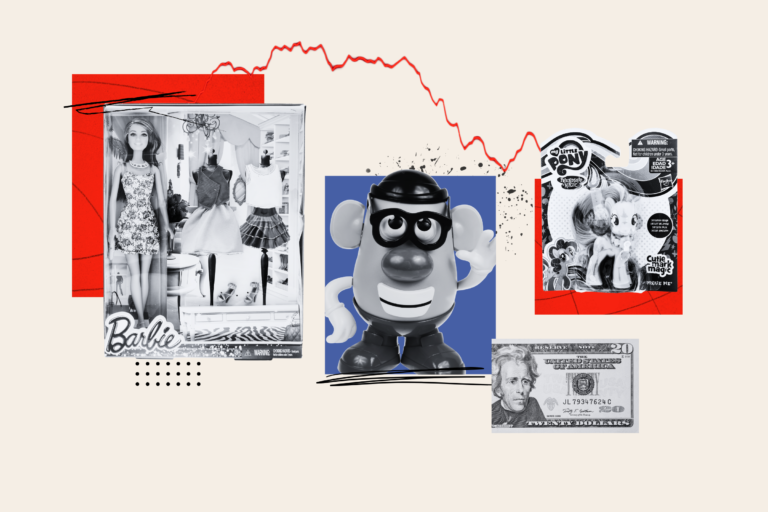America’s biggest toymakers are facing down a grim financial reality, as economic headwinds and U.S. trade policy continue to squeeze margins and see higher costs being passed onto the consumer.
Financial results released last week by America’s largest toy manufacturers, Mattel and Hasbro, revealed the continued costs of the trade war and lingering uncertainty around tariffs.
Mattel, whose brand portfolio includes Barbie dolls and the UNO card game, reported a 6 percent decline in second quarter net sales. Meanwhile, Hasbro, the company behind Nerf and My Little Pony, reported a 16 percent decline in revenue for its core toys and games business. While this was almost offset by significant improvements in its trading card and digital gaming segments, the company’s net sales were nevertheless down 1 percent year-over-year as it reported an $856 million net loss for the quarter.
Newsweek contacted Mattel and Hasbro via email on Tuesday for comment.
In their results and subsequent earnings calls, both companies cited the continued uncertainty created by tariffs, which continue to weigh on supply chains and inventory levels. Hasbro attributed its net loss in the quarter to a $1 billion impairment charge related to its consumer products segment and caused by the implementation of tariffs.
While most sectors of the economy are exposed to major shifts in trade policy, toys are particularly vulnerable given the industry’s reliance on globalized supply chains and outsized dependence on Chinese imports, with around three-quarters of the toys sold in America manufactured in China.
Prior to the 90-day pause agreed between the U.S. and China in May—which has seen tariffs temporarily lowered from their previous, staggering rates—the two companies were among those who said they may need to raise prices to offset the impact of tariffs. This led to toys—dolls in particular—becoming a surprising flash point in the debate over trade policy, and sparked a confrontation between the Trump administration and Mattel after CEO Ynon Kreiz said that the company had no plans to relocate manufacturing operations to the U.S.

Photo-illustration by Newsweek/Getty/Canva
Though both companies said that tariff-related headwinds had eased from earlier this year, price impacts are still set to take effect.
Mattel’s CFO Paul Ruh told analysts last week that only 40 to 50 percent of toys would remain under $20 despite given the “pricing actions” tariffs had demanded. Hasbro CEO Chris Cocks told CNN earlier this month that toy prices may increase this fall because of tariffs on Chinese and Vietnamese goods.
“We have already raised prices due to the tariffs and, unfortunately, the consumer will be paying for this,” said Isaac Larian, CEO and founder of the California-based toy company MGA Entertainment.
Larian told Newsweek that MGA, known primarily as the company behind Bratz dolls, had tried to absorb the costs associated with tariffs, but that “with small margins in the toy industry we have no choice but to pass along the tariff increases.”
The price of toys, games, hobbies and play equipment increased by 2.2 percent between April and May, compared to the 0.1 percent increase for all items, according to Labor Department Data. This was followed by a 1.2 percent jump in June, again outpacing the wider 0.3 percent increase.
According to MGA’s CEO, the impacts of tariffs have been far greater than anticipated by the industry.
“In addition to the increased import and export costs, the constant changes to the imposed tariffs have created a lot of uncertainty and nobody can run a business with uncertainty,” Larian told Newsweek.
Regarding the possibility of bringing manufacturing to the U.S. to offset these impacts, and increasing the share of toys made in its Hudson, Ohio factory, he said that, were this possible, MGA “would do so immediately.”
“However, it is just not possible to make certain toys in America,” he said. “China is the factory of the world – no other country has the know-how and infrastructure of China to make toys currently.”
Larian expects further price increases throughout the remainder of 2025, but is holding out hope for negotiations between the U.S. and China to permanently bring down tariffs to a manageable level.
Representatives of the two countries recently met in Stockholm for another round of trade talks. While the discussions concluded without a fully-fledged agreement to reduce tariffs, Treasury Secretary Scott Bessent described the meeting as “very productive.”
International Trade Representative for the Chinese Ministry of Commerce Li Chenggang said that both sides will “continue to push” for an extension on the 90-day pause beyond the deadline of August 12, CNN reports.


